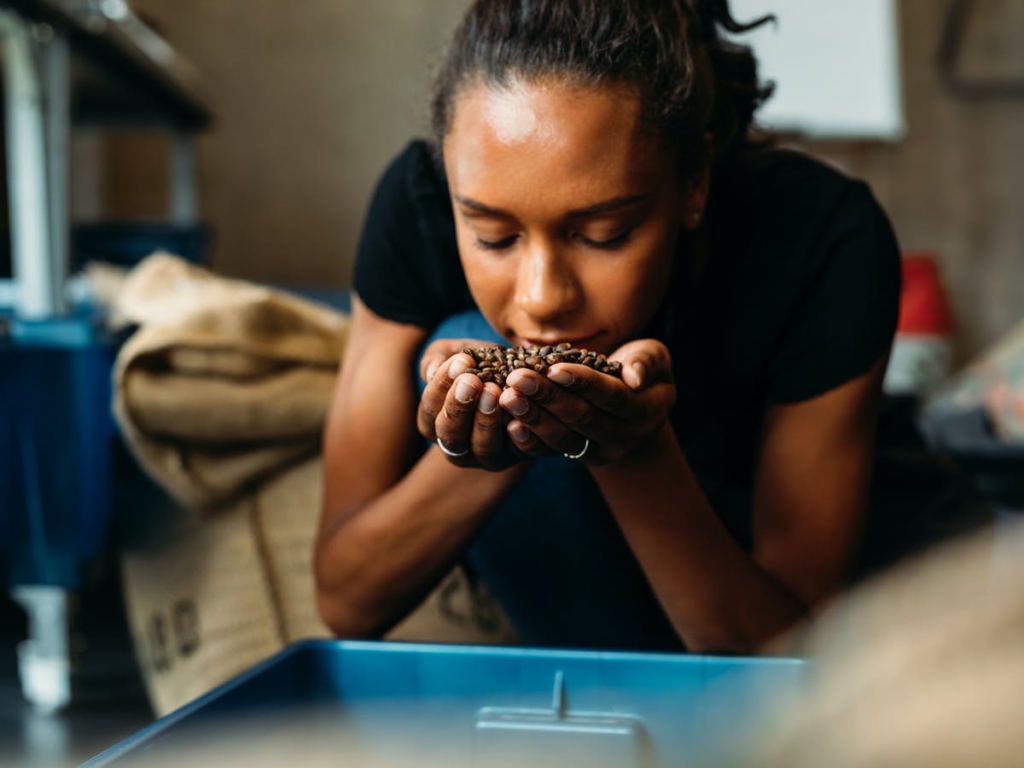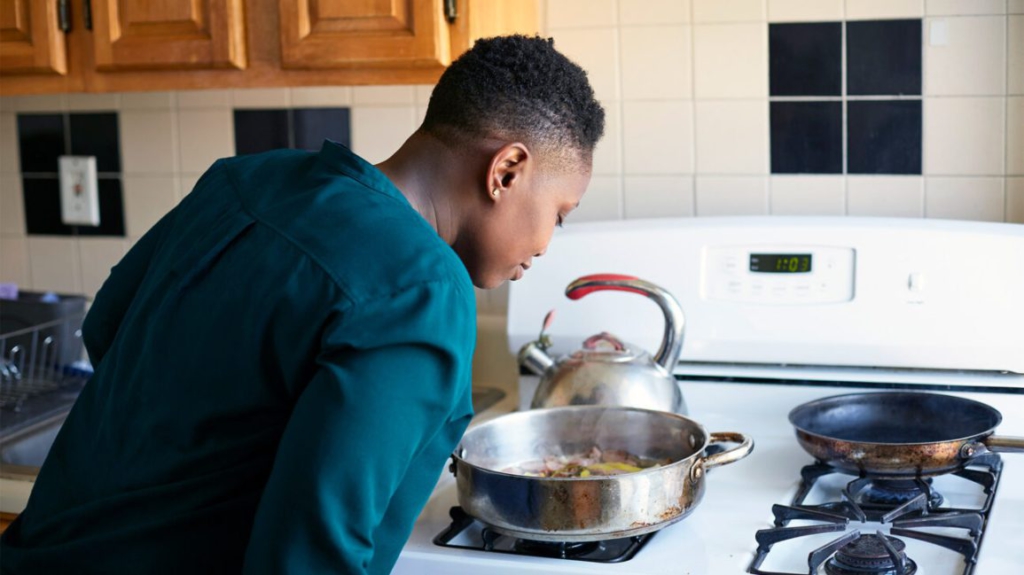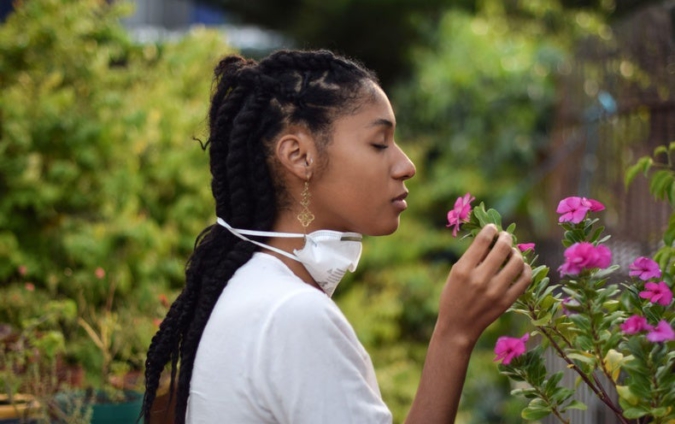Scientists are uncovering clues to explain how the coronavirus attacks the nervous system by studying a bizarre side effect of the infection that distorts sufferers’ sense of smell for months on end.
Since the pandemic began, doctors have puzzled over why the coronavirus causes as many as 80% of patients to experience anosmia, a temporary loss of smell.
Most patients recover their sense of smell within a week or two. But a smaller subset, probably 10% to 20% of those who experience sensory disruption, lose their sense of smell for much longer, and when it returns, they find their favorite foods, familiar scents and even their own body odors have changed, doctors and researchers say.
French fries might smell like putrid, rotting meat. Coffee sometimes evokes burning rubber tires. And chocolate can take on a sickly sweet, chemical odour.

This condition, known as parosmia, is the result of mixed-up signals between olfactory sensory neurons, the nerve cells located in the nasal cavity that detect scents, and the part of the brain where odors are decoded and interpreted.
Parosmia has also occurred in patients who have contracted other viral and bacterial infections that are known to directly attack and damage neurons, including influenza. With other infections, the condition is rare, but with the coronavirus, researchers have a bumper crop of cases to study.
Ellen Glynn, a 46-year-old who teaches high school art classes in Elizabeth, N.J., lost her sense of smell completely for three weeks after catching Covid-19 in March. It partially returned, but in May, she noticed that certain familiar foods, drinks and household products—onions, garlic, Keurig coffee pods, Tide laundry detergent—didn’t smell right.
“I thought, how could all these different things all have the exact same smell, of dead animal?” Ms. Glynn said.
Soon, she was so repulsed that she couldn’t eat most of the foods she was used to eating under what she describes as her “adventurous,” vegetarian diet. Doritos smelled rancid. Iced coffee’s odor made her gag. She said it smelled “like someone left uncooked chicken under a couch cushion for a few weeks.”
These days, Ms. Glynn is eating mostly English muffins, raw carrots and oranges, but says, little by little, the proper smells are returning. She sniffs essential oils as part of a regimen to remind herself what normal scents are like. She’s hopeful her sense of smell will return as before.
An enduring mystery about the coronavirus is how, exactly, it causes certain neurological reactions, such as smell loss or the persistent sense of disorientation known among patients as “brain fog.”
Possible explanations for the loss of smell include the theory that the virus kills off olfactory neurons, or that the body pre-emptively destroys certain neural pathways to keep the infection from reaching the brain—known as the “burning the bridge” theory—but little evidence exists to support them.
Over the summer, however, researchers from universities in the U.S., U.K. and Germany, led by Harvard University, published a series of studies in animals that indicated the ACE-2 receptor, the key protein through which the coronavirus enters the body, isn’t present in olfactory sensory neurons.
Their experiments involving mice showed it is more likely that the virus damages so-called sustentacular cells, the support cells in the nasal cavity that allow the smell-detecting neurons to function. When these support cells are infected, the body generates inflammation to try to isolate and fight off the virus.
Covid Long-Haulers Fear for Their FutureA significant number of Covid-19 patients are dealing with symptoms long after the initial infection. The Wall Street Journal asked four patients to share their stories about how lingering effects are affecting their lives.
If support-cell damage is minimal, a patient typically recovers their sense of smell quickly. But if enough sustentacular cells are damaged, or if there is enough inflammation, the neurons can also be killed or altered in function, leading to long-term loss of smell and parosmia.

“The big question is, does the coronavirus directly attack and kill neurons?” said Dr. Sandeep R. Datta, a neurobiologist at Harvard and lead author of two of the studies from the summer. “The widespread appearance of parosmia reflects the fact that in some patients, neurons are definitely dying. And the leading idea is that these neurons are being killed through an indirect mechanism.”
The good news about parosmia is that its occurrence indicates the sense of smell is gradually returning to normal and the body is repairing nerve damage caused by the virus.
Damaged or killed-off olfactory neurons can regenerate and reestablish a sense of smell via tendril-like transmitters called axons, which connect with the brain through microscopic openings in the part of the skull called the cribriform plate.
Scientists believe parosmia is the result of the trial-and-error process initiated when new olfactory neurons sprout up and reconnect to the brain, where smells are processed and interpreted. Complicating the process is that there are about 350 types of receptors related to detecting odors, and the human brain interprets smells as combinations of different signals.
“If this pattern of signals is not complete, the message the brain gets is not going to be interpretable,” said Dr. Nancy Rawson, a molecular biologist at the Monell Institute in Philadelphia, which studies the sense of smell. “It’s going to revert to some sort of a default perception. And it appears that the default perceptions are generally negative ones.”
“If you think of it in evolutionary terms,” she said, “if you have impaired sense of smell, it’s safer to err on the side of something smelling dangerous.”
The research focus now has shifted to understanding why parosmia is so common in Covid-19 patients.
Earlier this fall, scientists researching smell disruptions in cells of both mice and humans found further indications that smell loss is caused by the virus damaging support cells and by the body’s inflammatory response.
That finding “suggests that managing inflammation related to Covid infection could be a very important avenue to recovery,” Dr. Datta said. It also bolsters research that indicates the coronavirus itself doesn’t invade the brain, he said.
Loss of sense of smell could be a “canary in the coal mine” indicating how other neurological problems, such as brain fog and memory loss, might work, said Dr. Jonathan Overdevest, an ear, nose and throat doctor at New York-Presbyterian Hospital who is overseeing a study of olfactory dysfunction among 1,400 Covid-19 patients. Some 20% of the patients in the study suffer from parosmia.
“The concern was initially that this was a neuroinvasive virus like Zika…and if the virus can directly access the brain, the concern would be that people are going to have massive neurological insults, like strokes and [cytokine] storms,” Dr. Overdevest said. “The recent experiments have clarified that it’s not as neuroinvasive as we once feared. And that comes in large part from our fascination with the issue of olfactory dysfunction.”
That understanding “will help us understand the time course of recovery, and why some people recovered and why some didn’t,” he said.
Eight months after contracting Covid, Ms. Jenkins relies on co-workers to taste food in the kitchen because her sense of smell is still distorted.
Brenda Jenkins, a 53-year-old catering chef in Manhattan, lost her sense of smell completely in mid-March after exposure to the coronavirus on a cooking job. She went on to experience flulike symptoms and test positive.
Eight months later, her sense of smell has partially returned but remains blunted, and certain smells are distorted. Food trucks on the street emit a “rancid, oily” odor like spoiled meat, and perfume smells like a dirty diaper to her. Some familiar smells she can’t detect at all, such as vanilla or the hibiscus tea she used to drink daily. She has lost all of her private cooking clients and relies on co-workers to taste food in the kitchen.
“It’s almost as if someone put a protective shield in front of my entire sensory area,” Ms. Jenkins said. “I’m holding out hope that this is something that can get better, but for now I’m leaning a lot more on the timer. I’m learning to adjust, but I just can’t function normally in the kitchen.”
Helping patients recover their sense of smell is a priority for doctors, because smell is closely tied to mental health. Many patients who experience anosmia or parosmia for a long time also experience depression and anxiety.
Dr. Jane Parker, a chemist who studies the molecular basis for smells and flavors at the University of Reading in the U.K., is currently finishing a study on 45 patients, 15 of whom had Covid-related parosmia, to try to learn more about which specific scent compounds can trigger the condition.
“There’s so little research on parosmia that we just have to find out how it happens, and until we understand how it happens, we have little hope of treating it or mitigating it,” Dr Parker says.
Latest Stories
-
Angela Merkel defends ties with Russia and blocking Ukraine from Nato
2 mins -
Right to Dream are filling ‘the big gap’ in Ghana – UG Director of Sports
36 mins -
Prosecutor drops federal criminal cases against Trump
43 mins -
Asante Kotoko removes Prosper Ogum from Interim Management Committee
48 mins -
Emirates relieved as colleague returns safely after alleged kidnapping
53 mins -
Right to Dream unveils monument to celebrate silver jubilee
1 hour -
Developed countries commit $300bn annually to boost climate finance
1 hour -
Stratcomm Africa celebrates 30 years with inspiring Women S.H.A.R.E. anniversary event
1 hour -
26 arrested for brandishing, indiscrimimately firing toy guns in public
1 hour -
CHRAJ report confirms National Cathedral is a taxpayer-funded project – Ablakwa
2 hours -
H&M Manufacturing Limited CEO Charles Hanna named recipient of 100 Most influential People Awards, 2024
2 hours -
JoyNews National Dialogue on Clean Air set for November 26
2 hours -
National Cathedral: A-G must probe and surcharge if he finds breaches – Domelovo
3 hours -
National Security Ministry denies involvement in abduction of Sylvia Baah
3 hours -
Tears and pleas: Mpohor queenmother sobs over galamsey, poor roads during Mahama visit
3 hours

